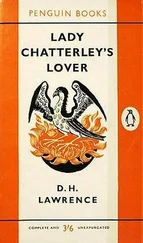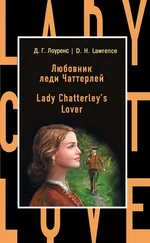He seemed a rather childish, impetuous fellow. He rowed with a certain exaggerated impetuosity, through the dark side-canals with the horrible, slimy green walls, the canals that go through the poorer quarters, where the washing hangs high up on ropes, and there is a slight, or strong, odour of sewage.
But at last he came to one of the open canals with pavement on either side, and looping bridges, that run straight, at right-angles to the Grand Canal. The two women sat under the little awning, the man was perched above, behind them.
“Are the signorine staying long at the Villa Esmeralda?” he asked, rowing easy, and wiping his perspiring face with a white-and-blue handkerchief.
“Some twenty days: we are both married ladies,” said Hilda, in her curious hushed voice, that made her Italian sound so foreign.
“Ah! Twenty days!” said the man. There was a pause. After which he asked: “Do the signore want a gondolier for the twenty days or so that they will stay at the Villa Esmeralda? Or by the day, or by the week?”
Connie and Hilda considered. In Venice, it is always preferable to have one’s own gondola, as it is preferable to have one’s own car on land.
“What is there at the Villa? what boats?”
“There is a motor-launch, also a gondola. But — ” The but meant: they won’t be your property.
“How much do you charge?”
It was about thirty shillings a day, or ten pounds a week.
“Is that the regular price?” asked Hilda.
“Less, Signora, less. The regular price — ”
The sisters considered.
“Well,” said Hilda, “come tomorrow morning, and we will arrange it. What is your name?”
His name was Giovanni, and he wanted to know at what time he should come, and then for whom should he say he was waiting. Hilda had no card. Connie gave him one of hers. He glanced at it swiftly, with his hot, southern blue eyes, then glanced again.
“Ah!” he said, lighting up. “Milady! Milady, isn’t it?”
“Milady Costanza!” said Connie.
He nodded, repeating: “Milady Costanza!” and putting the card carefully away in his blouse.
The Villa Esmeralda was quite a long way out, on the edge of the lagoon looking towards Chioggia. It was not a very old house, and pleasant, with the terraces looking seawards, and below, quite a big garden with dark trees, walled in from the lagoon.
Their host was a heavy, rather coarse Scotchman who had made a good fortune in Italy before the war, and had been knighted for his ultrapatriotism during the war. His wife was a thin, pale, sharp kind of person with no fortune of her own, and the misfortune of having to regulate her husband’s rather sordid amorous exploits. He was terribly tiresome with the servants. But having had a slight stroke during the winter, he was now more manageable.
The house was pretty full. Besides Sir Malcolm and his two daughters, there were seven more people, a Scotch couple, again with two daughters; a young Italian Contessa, a widow; a young Georgian prince, and a youngish English clergyman who had had pneumonia and was being chaplain to Sir Alexander for his health’s sake. The prince was penniless, good-looking, would make an excellent chauffeur, with the necessary impudence, and basta! The Contessa was a quiet little puss with a game on somewhere. The clergyman was a raw simple fellow from a Bucks vicarage: luckily he had left his wife and two children at home. And the Guthries, the family of four, were good solid Edinburgh middle class, enjoying everything in a solid fashion, and daring everything while risking nothing.
Connie and Hilda ruled out the prince at once. The Guthries were more or less their own sort, substantial, but boring: and the girls wanted husbands. The chaplain was not a bad fellow, but too deferential. Sir Alexander, after his slight stroke, had a terrible heaviness his joviality, but he was still thrilled at the presence of so many handsome young women. Lady Cooper was a quiet, catty person who had a thin time of it, poor thing, and who watched every other woman with a cold watchfulness that had become her second nature, and who said cold, nasty little things which showed what an utterly low opinion she had of all human nature. She was also quite venomously overbearing with the servants, Connie found: but in a quiet way. And she skilfully behaved so that Sir Alexander should think that he was lord and monarch of the whole caboosh, with his stout, would-be-genial paunch, and his utterly boring jokes, his humourosity, as Hilda called it.
Sir Malcolm was painting. Yes, he still would do a Venetian lagoonscape, now and then, in contrast to his Scottish landscapes. So in the morning he was rowed off with a huge canvas, to his “site”. A little later, Lady Cooper would he rowed off into the heart of the city, with sketching-block and colours. She was an inveterate watercolour painter, and the house was full of rose-coloured palaces, dark canals, swaying bridges, medieval facades, and so on. A little later the Guthries, the prince, the countess, Sir Alexander, and sometimes Mr Lind, the chaplain, would go off to the Lido, [118] Лидо — длинная песчаная отмель в Венецианской лагуне; с 1857 г. там располагалась первая в Европе организованная морская курортная зона.
where they would bathe; coming home to a late lunch at half past one.
The house-party, as a house-party, was distinctly boring. But this did not trouble the sisters. They were out all the time. Their father took them to the exhibition, miles and miles of weary paintings. He took them to all the cronies of his in the Villa Lucchese, he sat with them on warm evenings in the piazza, having got a table at Florian’s: he took them to the theatre, to the Goldoni plays. There were illuminated water-fetes, there were dances. This was a holiday-place of all holiday-places. The Lido, with its acres of sun-pinked or pyjamaed bodies, was like a strand with an endless heap of seals come up for mating. Too many people in the piazza, too many limbs and trunks of humanity on the Lido, too many gondolas, too many motor-launches, too many steamers, too many pigeons, too many ices, too many cocktails, too many menservants wanting tips, too many languages rattling, too much, too much sun, too much smell of Venice, too many cargoes of strawberries, too many silk shawls, too many huge, raw-beef slices of watermelon on stalls: too much enjoyment, altogether far too much enjoyment!
Connie and Hilda went around in their sunny frocks. There were dozens of people they knew, dozens of people knew them. Michaelis turned up like a bad penny. “Hullo! Where you staying? Come and have an ice-cream or something! Come with me somewhere in my gondola.” Even Michaelis almost sun-burned: though sun-cooked is more appropriate to the look of the mass of human flesh.
It was pleasant in a way. It was almost enjoyment. But anyhow, with all the cocktails, all the lying in warmish water and sunbathing on hot sand in hot sun, jazzing with your stomach up against some fellow in the warm nights, cooling off with ices, it was a complete narcotic. And that was what they all wanted, a drug: the slow water, a drug; the sun, a drug; jazz, a drug; cigarettes, cocktails, ices, vermouth. To be drugged! Enjoyment! Enjoyment!
Hilda half liked being drugged. She liked looking at all the women, speculating about them. The women were absorbingly interested in the women. How does she look! what man has she captured? what fun is she getting out of it? — The men were like great dogs in white flannel trousers, waiting to be patted, waiting to wallow, waiting to plaster some woman’s stomach against their own, in jazz.
Hilda liked jazz, because she could plaster her stomach against the stomach of some so-called man, and let him control her movement from the visceral centre, here and there across the floor, and then she could break loose and ignore “the creature”. He had been merely made use of. Poor Connie was rather unhappy. She wouldn’t jazz, because she simply couldn’t plaster her stomach against some “creature’s’ stomach. She hated the conglomerate mass of nearly nude flesh on the Lido: there was hardly enough water to wet them all. She disliked Sir Alexander and Lady Cooper. She did not want Michaelis or anybody else trailing her.
Читать дальше
Конец ознакомительного отрывка
Купить книгу
![Дэвид Лоуренс Lady Chatterley's Lover [С англо-русским словарем] обложка книги](/books/26613/devid-lourens-lady-chatterley-s-lover-s-anglo-cover.webp)
![Герберт Уэллс - The War of the Worlds [С англо-русским словарем]](/books/26611/gerbert-uells-the-war-of-the-worlds-s-anglo-thumb.webp)
![Джейн Остин - Sense and Sensibility [С англо-русским словарем]](/books/26612/dzhejn-ostin-sense-and-sensibility-s-anglo-thumb.webp)
![Джек Лондон - Hearts of Three [С англо-русским словарем]](/books/26615/dzhek-london-hearts-of-three-s-anglo-thumb.webp)
![Чарльз Диккенс - A Tale of Two Cities [С англо-русским словарем]](/books/26616/charlz-dikkens-a-tale-of-two-cities-s-anglo-thumb.webp)
![Коллектив авторов - Best Short Stories [С англо-русским словарем]](/books/26635/kollektiv-avtorov-best-short-stories-s-anglo-thumb.webp)
![Брэм Стокер - Dracula [С англо-русским словарем]](/books/26636/brem-stoker-dracula-s-anglo-russkim-slovarem-thumb.webp)





